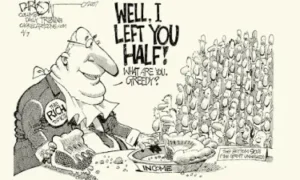Introduction: Neoliberalism Impact
Neoliberal ideology has reshaped the global economic landscape, prioritizing unregulated markets, privatization, and the concentration of wealth. This economic framework emphasizes individual entrepreneurship and minimal state intervention, which, while promoting economic growth, often sidelines environmental sustainability and social equality. As we delve deeper into the effects of neoliberalism, we see a clear pattern of environmental degradation and increased social disparity, calling for an urgent reassessment and redirection towards more sustainable and fair practices.
Greed: The Catalyst of Environmental Destruction
Unchecked Desire for Wealth and its Consequences

Greed, a central pillar of neoliberal thought, manifests in an unending pursuit of wealth. This relentless drive compels corporations and individuals to prioritize financial success over environmental health. An example of this is the deforestation of the Amazon rainforest, where vast tracts of land are cleared for agriculture and mining, disregarding the ‘lungs of the Earth’ and its critical role in regulating global oxygen and carbon cycles.
Short-term Profits vs. Long-term Ecological Health
The neoliberal focus on short-term gains often results in the oversight of long-term environmental sustainability. This approach has led to significant ecological disruptions, such as soil degradation, water scarcity, and loss of biodiversity. By ignoring the environmental cost of immediate profits, neoliberal policies jeopardize not only the natural assets but also the future economic stability that depends on these natural resources.
Power Concentration: A Threat to Democracy and Equality
How Neoliberalism Impact Fuels Inequality
Neoliberal policies accelerate inequality by focusing on deregulation, tax cuts for the wealthy, and reduction of public spending on social services. This economic approach assumes that free markets without government intervention lead to efficient outcomes, but in practice, it often results in wealth accumulating at the top while the middle and lower classes see stagnation or decline in their income levels.
Concentration of Wealth and Reduced Social Mobility

In neoliberal economies, wealth becomes concentrated in the hands of a few, significantly impacting social mobility. The reduction in progressive taxation and the decline in welfare support systems mean fewer opportunities for the lower-income brackets to improve their socio-economic status. Education and health services, vital for leveling the playing field, often become privatized, making them less accessible to those with lower incomes.
The Impact on Worker Rights and Wages
Neoliberalism impact advocates for flexible labor markets, which translates to less job security, weaker unions, and stagnant wages amidst rising productivity. This flexibility tends to favour employers at the expense of workers, leading to a precarious workforce that must contend with irregular hours, contract work without benefits, and the constant threat of job loss. Such conditions not only exacerbate income inequality but also contribute to a broader sense of instability and injustice within society.
Neoliberalism Impact, Corporate Influence and Regulatory Inaction
The sway of large corporations in political and regulatory realms is a defining feature of neoliberalism. This influence is exercised through substantial lobbying efforts, campaign financing, and the revolving door between corporate jobs and government positions, which skew policies in favor of business interests over public or environmental welfare.
Lobbying and the Shaping of Public Policy
Corporate lobbying efforts result in laws and regulations that favor business interests. Industries such as fossil fuels, pharmaceuticals, and finance spend millions to influence legislation that affects their operations. The outcome is often lax regulation on environmental practices, favorable tax structures, and subsidies that support corporate interests at the expense of public goods.
Regulatory Capture and Its Consequences
Regulatory capture occurs when regulatory agencies are dominated by the industries they are charged with overseeing, leading to a form of decision-making that is beneficial to private interests rather than the public. This results in weakened enforcement of environmental laws, insufficient penalties for pollution, and a general slowdown in the adoption of regulations that would address issues like climate change, public health, and economic disparities.
Expanding on these sections provides a clearer understanding of how neoliberal policies not only foster economic disparities but also allow corporate interests to override public welfare, leading to systemic issues that affect various aspects of societal well-being and environmental health.
Profit Over Ethics: The Neoliberal Creed
In a neoliberal framework, the pursuit of profit often overrides ethical considerations, leading to widespread corruption and unethical business practices. This ethos prioritizes maximizing shareholder returns and boosting short-term financial results at the expense of broader societal and environmental concerns. This section examines the mechanisms through which profitability often trumps ethics in neoliberal systems and the impacts of such practices.
The Primacy of Shareholder Value
Under neoliberalism, the doctrine of maximizing shareholder value dominates corporate strategies. This focus encourages companies to cut costs and increase efficiencies, often at the expense of environmental sustainability and labor conditions. For instance, corporations might outsource production to countries with lower labor costs and minimal environmental regulations, leading to exploitation and environmental degradation. The relentless drive for lower costs and higher profits can result in compromised safety standards, leading to disasters like industrial accidents and environmental spills.
Short-term Gains at Long-term Costs
The emphasis on short-term profitability pressures companies to prioritize immediate financial returns over long-term sustainability. This approach can lead to decisions that secure quick profits but sow the seeds for future crises, such as ignoring the long-term environmental impact of extracting natural resources or investing in technologies harmful to the environment. Such short-sightedness not only jeopardizes the planet’s ecological balance but also exposes companies and their stakeholders to future financial and reputational risks.
Ethical Erosion and Corporate Scandals
The erosion of ethics in pursuit of profit is often manifested in corporate scandals involving fraud, corruption, and misleading conduct. High-profile cases of financial misrepresentation, bribery, and corruption are symptomatic of a broader culture within some neoliberal environments where ethical lines are blurred or ignored altogether. These scandals not only lead to financial losses and legal penalties but also erode public trust in businesses and institutions, having a chilling effect on economic stability and integrity.
The Role of Corporate Governance
Effective corporate governance is crucial in ensuring that companies adhere to ethical standards. However, in the neoliberal context, governance structures often fail to check the excesses driven by profit motives. Boards of directors may lack independence, being composed of members with conflicts of interest or too closely aligned with management. Without robust governance and accountability mechanisms, unethical practices can proliferate, shielded by a veneer of legality and compliance.
Expanding this section highlights the inherent conflict within neoliberalism between relentless profit pursuit and ethical business practices. It underscores the need for a reevaluation of current economic models to incorporate ethical considerations into the core of business strategies, ensuring sustainability and fairness for all stakeholders.
The Impact of Corruption on Environmental Policies
The pervasiveness of corruption in neoliberal systems makes it difficult to enact strong environmental protections. Unethical practices undermine trust in institutions and prevent the implementation of policies that could lead to sustainable outcomes. The result is a regulatory environment that does not check the excesses of industries most responsible for environmental degradation.
The Dire Consequences of Neoliberal Policies
Environmental Degradation and Social Inequality
Neoliberalism’s prioritization of growth at any cost has led to widespread environmental and social crises. The degradation of natural habitats, pollution of air and water, and the unsettling rise in greenhouse gas emissions are just some manifestations of these policies. Socially, the wealth gap widens, and access to essential services like healthcare and education becomes more disparate.
A Call for Systemic Change
Addressing these challenges requires a fundamental rethinking of economic priorities and policies. It involves shifting focus from GDP growth to metrics that value human well-being and ecological health. This systemic change will promote a more balanced approach to development, where economic activities are harmoniously integrated with environmental stewardship.
Conclusion: Moving Towards a Sustainable Future
As the detriment of neoliberalism impact become increasingly clear, there is a growing imperative for change. We must champion sustainable practices, invest in renewable energy, and advocate for policies that are fair and transparent. The time to act is now, and each of us has a role in shaping a sustainable and fair future.
Engage and Take Action
Are you ready to challenge the destructive forces of neoliberalism for a sustainable future?
Take Action Now
Advocate for sustainable practices and fair policies. Demand transparency and accountability from our leaders. Join the movement for a just and thriving planet.
Share This Article
Help spread the word by sharing this article with your contacts and on social media. Together, we can make a difference.
References:
Neoliberalism has conned us into fighting climate change as individuals: https://www.theguardian.com/environment/true-north/2017/jul/17/neoliberalism-has-conned-us-into-fighting-climate-change-as-individuals
Challenging Neoliberalism: https://www.ncbi.nlm.nih.gov/pmc/articles/PMC6293342/
The Deadly Consequences of Greed: An Unhappy Life and an Early Death: https://carbonatedthoughts.store/blogs/news/the-deadly-consequences-of-greed-an-unhappy-life-and-an-early-death
Reviewing the relationship between neoliberal societies and nature: implications of the industrialized dominant social paradigm for a sustainable future: https://www.ncbi.nlm.nih.gov/pmc/articles/PMC7613825/
Neoliberalism is dying – now we must replace it: https://www.opendemocracy.net/en/oureconomy/neoliberalism-is-dying-now-we-must-replace-it/

